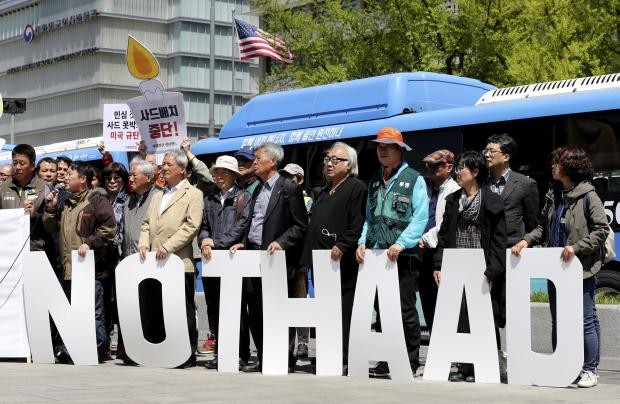AP Explains: Why South Korea is debating US anti-missile system

Protesters hold letters reading “NO THAAD” during a rally to oppose a plan to deploy an advanced US missile defense system called Terminal High-Altitude Area Defense, or THAAD, near the US Embassy in Seoul, South Korea, Wednesday, April 26, 2017. In a defiant bit of timing, South Korea announced Wednesday that key parts of a contentious US missile defense system had been installed a day after rival North Korea showed off its military power. (Photo by LEE JIN-MAN / AP)
SEOUL, South Korea — Amid alarm over North Korea’s expanding nuclear weapons and missile arsenal, Washington and Seoul are speeding ahead with the installment of an advanced US anti-missile system in South Korea to cope with the growing threats.
Despite the seemingly straightforward purpose, the deployment of the Terminal High-Altitude Area Defense system, or THAAD, remains a controversial topic in South Korea and even has become an issue in the upcoming presidential election.
Here’s a look at how THAAD works and why it became a debated issue in South Korea.
System protects against midrange missiles
A THAAD battery, including the one currently being installed in southern South Korea, consists of six truck-mounted launchers that can fire up to 48 interceptor missiles. There is also fire control and communication equipment and a powerful X-band radar officially known as AN/TPY-2.
THAAD is designed to take out incoming targets in midflight at relatively high altitudes and military experts say the system could provide protection against North Korea’s midrange missiles.
Article continues after this advertisementSome experts believe South Korea will eventually need more THAAD systems to cover a broader part of its territory if it wants to counter recent efforts by the North to beef up its arsenal of solid-fuel midrange missiles that can be fired from mobile launchers and submarines.
Article continues after this advertisementUnclear when system will be operational
The United States and South Korea began installing THAAD last month and South Korea’s Yonhap news agency said Wednesday that key parts, including six launchers, interceptor missiles and a radar, have been deployed. South Korea’s Defense Ministry confirmed there was progress in the system’s installment, but didn’t specify which parts of THAAD were deployed. The ministry said Seoul and Washington have been pushing to get THAAD operating soon.
China is concerned over THAAD radar
The plan to deploy THAAD has angered North Korea as well as China, which sees the system as a security threat despite reassurances that the system is purely defensive.
South Korea has raised suspicions that China is retaliating against plans for THAAD by limiting Chinese tour group visits to South Korea, whose economy is increasingly dependent on Chinese tourism and demand for its industrial products.
China says that THAAD’s radar can be reconfigured to peer deep into its territory and monitor its flights and missile launches. Military experts outside of China say Beijing’s worries are exaggerated and THAAD in South Korea wouldn’t meaningfully improve US monitoring ability when Washington already watches Chinese missile launches through radar systems installed in Qatar, Taiwan and Japan.
They say there’s little reason to reconfigure the THAAD radar in South Korea to a “forward-based mode” when that would disable the system from intercepting incoming missiles.
Locals are worried about system safety
Residents in the rural South Korean town of Seongju, where the first THAAD battery will sit in a converted golf course, have expressed worries about rumored health hazards linked to the system’s radar. South Korea’s Defense Ministry says such worries are groundless and no such issues have been reported at THAAD sites in other countries.
Issue stoking debate on campaign trail
South Korean presidential front-runner Moon Jae-in has vowed to reconsider the deployment if he wins the May 9 election, saying that the country should consider relations with China.
He says that the security benefits of THAAD would be curtailed by worsened relations with the country’s biggest trading partner.
His camp issued a statement Wednesday denouncing the installment and saying public opinion was being ignored. Moon’s closest competitor, Ahn Cheol-soo, has voiced support for THAAD deployment, but has also said he would be willing to ask the US to withdraw the system of China agrees to aggressively pressure North Korea to give up its nuclear ambitions.